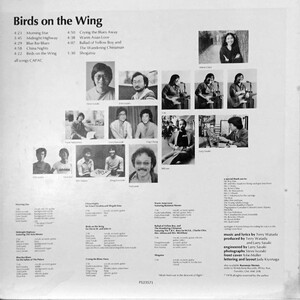Information/Write-up
Terry Watada is a Japanese-Canadian artist whose career bridges music, literature, theatre, history, and cultural commentary. A singer-songwriter, poet, novelist, playwright, essayist, and activist, he has spent more than four decades documenting both the Japanese-Canadian experience and universal questions of memory, resilience, and belonging.
Music
Watada first came to notice as a musician in the late 1970s, privately recording three albums that stand today as rare documents of Asian-Canadian independent music. His debut, Runaway Horses (1977), was followed by Morning Star (1978, Windchime Records) and Living in Paradise (early 1980s). These recordings blended folk, blues, protest, and pop influences, pairing acoustic instrumentation with lyrics that reflected Japanese-Canadian history and personal reflection.
He collaborated with musicians including Larry Sasaki, Martin Kobayakawa, Garry Kawasaki, Frank Nakashima, R.A. Shiomi, and David Henry Hwang, drawing on Toronto’s Asian-Canadian creative community. Although released outside the commercial mainstream, the albums circulated through independent networks and became important cultural statements. Over time, Watada went on to produce ten albums, most featuring his own compositions, cementing his place as one of the few Japanese-Canadian singer-songwriters of his generation to record extensively.
Writing
While his albums remain touchstones of 1970s Asian-Canadian creativity, Watada’s literary career is even more extensive. He has published six poetry collections, including Ten Thousand Views of Rain, Obon: The Festival of the Dead, The Game of 100 Ghosts (2014), and The Four Sufferings (2020). His unpublished Crows at Sunset was a finalist in the 2020 Eyelands International Book Awards in Athens, Greece.
As a novelist, he is the author of Kuroshio: The Blood of Foxes (2007), The Three Pleasures (2017), and Mysterious Dreams of the Dead (2020). His fourth novel, Hiroshima Bomb Money, received a $10,000 Toronto Arts Council grant. His short story collection Daruma Days (1997) remains a cornerstone of Asian-Canadian fiction, and his bibliography extends further to two manga, two children’s biographies, and two histories of the Buddhist Church in Canada.
Watada is also a playwright of note: seven of his plays have received mainstage productions. Among them, Vincent—a searing work about police violence and mental illness—was staged at the National Theatre in Ottawa, Toronto’s Harbourfront International Madness Festival, and in Münster, Germany, earning international recognition.
Columnist & Essays
For 25 years Watada contributed a monthly column to Nikkei Voice, chronicling Japanese-Canadian community life with a blend of humor, insight, and cultural critique. Since 2012, he has also written regularly for the JCCA Bulletin/Geppo, where his nearly thirty years of essays remain a vital record of Japanese-Canadian thought.
In these columns, Watada reflected on topics as wide-ranging as Hollywood stereotypes (Asians and the Oscars, 2016), community memory (Oshogatsu: the Last New Year’s, 2016, recalling his father Matsujiro), pop culture (Stale Off the Boat, 2015), redress (My Last Word on Redress, 2014), and tributes to figures such as James Shigeta, Yuri Kochiyama, and Irene Uchida. His pieces wove together personal memoir, cultural history, and sharp political commentary, offering one of the longest continuous chronicles of Japanese-Canadian community life in print.
His essays have also appeared in journals including Maclean’s Magazine, Canadian Literature (UBC), and Ritsumeikan Hogaku (Kyoto). Critical studies of his work have been published in the International Journal of Canadian Studies, Modern Drama (University of Toronto Press), and Transcultural Reinventions: Asian American and Asian Canadian Short-Story Cycles.
Recognition
Watada’s contributions have been recognized with numerous honours, including the Queen Elizabeth II Diamond Jubilee Medal, the National Merit Award from the National Association of Japanese Canadians, and the Gordon Hirabayashi Human Rights Award.
Legacy
Across song, poem, novel, play, and column, Terry Watada has given voice to Japanese-Canadian identity and the struggles and joys of cultural survival. His albums—Runaway Horses, Morning Star, and Living in Paradise—remain touchstones of Asian-Canadian independent music, while his literary works are widely read and studied. Through his columns in Nikkei Voice and the JCCA Bulletin/Geppo, he became one of the most consistent and insightful chroniclers of Japanese-Canadian life, blending humor, critique, and memory into a body of work that continues to resonate.
-Robert Williston
Music and lyrics by Terry Watada
Produced by Terry Watada and Larry Sasaki
Engineered by Larry Sasaki
Recorded at Orpheus Sound
Cover by Robin Muller
Photography by Steve Isozaki
Layout and typography by Judy Kiyonaga



No Comments